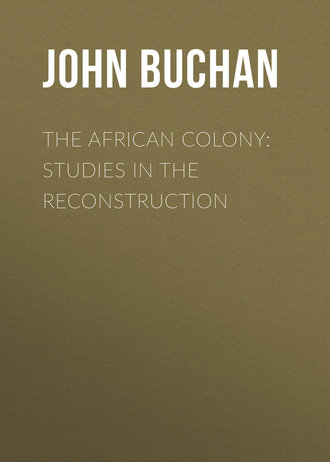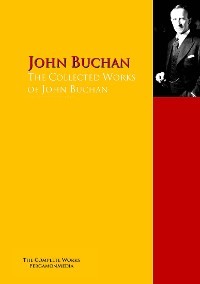 полная версия
полная версияThe African Colony: Studies in the Reconstruction
There is one contingency alone which must be regarded with the greatest dread – the growth of a South African party, which is South African because anti-British. The war raised colonial loyalty to a height; but such loyalty is like a rocket, which may speedily expire in the void in a blaze of brightness, or may kindle a steady flame if the material be there. We must remember that we have in the Dutch a large population to which the British tie means nothing; a large and important class, in the cosmopolitan financiers, who may be covertly hostile to British interests; and even in some of the most sterling and public-spirited citizens men who, if the Dutch Government had allowed them, would have surrendered their nationality and become citizens of the republics. South African loyalty, splendid as it is, is rather fidelity to British traditions than to that overt link which constitutes empire. You will, indeed, hear the true theory of colonial policy well stated and strongly defended; but it must not be forgotten that in South Africa it is still somewhat of an exotic plant, and wants careful tending before it can come to maturity. Unadvised action on our part may nip the growth, and give a chance for a party which might declare, to adopt the words of the old loyalists of Lower Canada, that it was determined to be South African even at the cost of ceasing to be British. A too long or too straitly ordered tutelage might do it, or a harsh dictation on some local question of vital interest, or the continuance of the old calumnies about the Rand, the old vulgar sneer at the colonial-born. It is well to remember that while the land is a Crown colony it is one only in name, and that all the tact and discretion which we use in dealing with self-governing colonies should be used in this case also.
Such a party may arise, but there is no reason in the nature of things for its existence. South African and British are not opposites. As I understand the theory of colonial government, England stands towards her colonies as a parent who starts his sons in the world, wishing them all prosperity; and though in after-years he may exercise the parental right of giving advice, he will not attempt to coerce the action of those who have come to years of maturity. The tie is strongest when it is not of the letter but of the spirit. At the same time it is well to preserve certain outward and visible signs of descent, – well for the fatherland, better for the colonies, who draw from that fatherland their social and political traditions and their spiritual sustenance. At the moment South Africa is in a transition stage. Her public opinion is scarcely formed on any subject; she is full of vague aspirations, uneasy yearnings, and half-fledged hopes. She will develop either into the staunchest of allies in any imperial federation, or the most recalcitrant and isolated of colonies. She has enough and to spare of good men who desire nothing more than that the African nation, when it comes, should be a British people, and if she is trusted whole-heartedly, she will not betray the trust. She will even accept advice and reproof in proper cases, for, unless we drive her to ingratitude, she is not ungrateful for the blood and treasure which Britain has spent on her making. But she is like a young well-bred colt, whose mouth may be easily spoiled by over-bitting, and whose temper will be ruined by the bad hands or too hasty temper of its trainer.
Two important constitutional questions remain. One is the great policy of Federation, which looms as a background behind all sporadic constitutional forms. The second concerns that part of the imperial forces which is to be stationed in South Africa – a matter which is not only an army question but one deeply affecting colonial interests. To these the two succeeding chapters are devoted.
CHAPTER XVII.
THE POLICY OF FEDERATION
No South African problem is more long-descended than the question of Federation. It was a dream of Sir George Grey’s in the mid-century, and it was a central feature in the policy of Sir Bartle Frere – that policy which, after twenty years of obscuration, is at last seen in its true and beneficent light. Nor was it held only by English governors. Local statesmen in Cape Colony saw in it a panacea for the endless frontier difficulties which tried their patience and their talents. The ultra-independent colonist, in whose ears “Africa for the Afrikanders” was beginning to ring, seized upon it as a lever towards a more complete autonomy. Men like Mr Rhodes, to whom Africa was an empire and its people one potential nation, looked on it as the first step towards this larger destiny. Every student of political history for the last fifty years, considering the physical situation of the different states and the absence of any final dividing line between them, confidently anticipated for South Africa, and under more favourable conditions, the development which Australia has already reached. But the movement shipwrecked on the northern republics. Old grievances and jealousies set the Transvaal and the Orange Free State in arms against the prospect, and, since the essence of federation is full mutual consent, the project failed at the first hint of serious opposition. Now all things are changed. The social and constitutional difficulties which would obviously arise from the inclusion of independent or all but independent states in a federation of colonies have disappeared with the independent states themselves. Now at last all South Africa save the Portuguese and German seaboards is under one flag.
The chief barriers have gone, but the need for federation is as insistent as ever. A common flag is a strong tie, but it does not in practice prevent many local jealousies and petty oppositions. Disunion is only justifiable among colonies of equal standing when there is some insuperable physical barrier between them or some radical disparity of interests. Providence is so clearly on the side of the larger social battalions, that an isolated state, though within a colonial system, is at a disadvantage even in matters concerning its own interests. The nationalism which rejoices in local distinctions, however recent in origin, is admirable enough in its way, and ought to be preserved; therefore the complete merging of several units in one is always to be regretted, even when justified by grave needs. The new state will never or not for a long time acquire the consistency and proud self-consciousness of the destroyed units. But federation shows another and a better way. The parts are maintained in full national existence, but in so far as their interests transcend their own boundaries they are united in one larger state. There is another advantage, often pointed out by American writers on the subject, which concerns a country like South Africa, whose boundaries cannot yet be said to be finally delimited. North of the Zambesi there is a vast vague region, partly under the High Commissioner, partly included in British Central Africa, which in time will become separate colonies, with interests wholly different from the states of the south. To add a new tract and a novel population to a state is always a difficult matter, for the existing régime may be most unsuited for such extension. But it is easy to include a new colony in a federation. In Mr Bryce’s words, federation “permits an expansion, whose extension and whose rate and manner of progress cannot be foreseen, to proceed with more variety of methods, more adaptation of laws and administration to the circumstances of each part of the territory, and altogether in a more truly natural and spontaneous way than can be expected under a centralised government. Thus the special needs of a new régime are met by the inhabitants in the way they find best; its special evils are met by special remedies, perhaps more drastic than an old country demands, perhaps more lax than an old country would tolerate; while at the same time the spirit of self-reliance among those who build up these new communities is stimulated and respected.”34
The need for federation in the case of South Africa is made greater by the fact that there are one or two burning questions common to all her states which cannot be satisfactorily settled save by joint action. Foremost stands the native problem. If there is not some sort of geographical continuity of policy in the treatment of natives, all our efforts will be unavailing. The natives of South Africa may be regarded, among other things, as a great industrial reserve; and if the policy outlined in another chapter is to be followed, different labour laws and different methods of taxation may work incalculable harm. If extravagant inducements to work are held out in the Transvaal, it will not be long before the labour market is ruined elsewhere. If an improvident system of taxation exists in Natal, it may unsettle and discontent other native populations, since it is highly probable that in the future natives will be less tied to localities, and will move through the whole country in search of work. The mining authorities have long recognised the necessity of a single policy, as is shown by such institutions as the Chamber of Mines and the Native Labour Association; and it would be odd if in political questions, where the need is equally urgent, the same truth should be neglected. In connection with natives the control of the sale of intoxicants is another matter of South African importance. It is a matter on which South Africa is now practically at one; but there are limits to the prescience of local legislation and local officials, and it may easily happen that an inadequate law inadequately administered in one colony may undo most of the good that an energetic administration is attempting in another. If identity of policy, again, is indispensable in relation to the subject races, the same identity is most desirable in those inter-racial questions between white men which will long have their place in South African politics. An unwise treatment of the Dutch population in the Cape will infallibly react on the new colonies. Any one who knows the way in which Cape precedents in this connection are quoted in the Transvaal, just as Transvaal precedents were quoted before the war in the Cape, will recognise the difficulty which the present disunion creates. In educational matters, such as the proportion of time devoted to the teaching of the Dutch language, while every colony must necessarily decide for itself, there is great need of one controlling authority to supervise and direct. There is, again, the question of permit law and the exclusion of undesirables, and the kindred matter of the position of the imperial forces. A lax permit law in one colony nullifies all the strictness of its neighbours. Army questions – whatever the future position of the South African force – will always have an intercolonial significance, for the different troops are under one commander-in-chief, they will meet for training and manœuvres, and they are part of one general scheme of imperial defence. In some questions an attempt at co-operation has already been made, – in railway conferences and customs unions, – but it is obviously a clumsy method which proceeds from conference agreements to ratification by the several legislatures; and many important and difficult questions will go on arising from day to day which will be decided in quite different ways by local authorities, to the confusion of all and the increase of unnecessary distinctions. Lastly, there are a number of lesser matters, of which veterinary and game regulations may be taken as the type, whose treatment, to be satisfactory, must be governed by a common principle and in the hands of a common executive.
Such are a few of the practical reasons for federation. There is a deeper reason based on the future of our colonial system. South Africa at the present moment is deeply cleft by gulfs of race, fiscal policy, imperial attachment. There will always be within her bounds a party, not perhaps a very important or very intelligent party, made up of those to whom the British tie is galling and the tradition of kinship mere foolishness. If the present particularism is allowed to remain unreformed, it may easily happen that in this colony or that some turn of the political wheel may give such a party an authoritative voice, and the result may be the beginning of endless misunderstandings, and in the end the creation of an impassable gulf. It is because South Africa as a whole is so unswerving in her loyalty that it is wise to create some united authority representing the whole land, and looking at this great question from a high standpoint, which can provide against the parochialism of a party and the accidental caprice of a state. This feeling is strong among the English inhabitants of the new colonies, and is, I believe, destined to grow in width and strength throughout the country, when the fever of reconstruction is at an end and South Africa has leisure to meditate on her political future.
If we examine present conditions we can discern, to borrow the common metaphor of writers on federation, both centripetal and centrifugal tendencies. To begin with, the constitutional framework exists. The head of a federation is already at hand in the High Commissioner, in whom is vested the government of all South Africa apart from the self-governing colonies. It was the custom formerly to combine this office with the governorship of the Cape: for the moment it is joined with the governorship of the Transvaal and the Orange River Colony. With the present narrow definition of the High Commissioner’s duties, it is right that this should be so; but there is no constitutional reason why he should not be a separate official. It has never been a popular office with self-governing colonies, who dislike the idea that the governorship should have in one of its aspects powers over which the colony has no control; but this objection could not arise to the head of a federal government. By the letters patent of 1900 the High Commissioner is invested with the control of the South African Constabulary in the new colonies and the administration of the Central South African railways, and he is empowered to call together conferences of the self-governing colonies for the discussion of common problems. Here is already existing the administrative machinery of a federation. The rock on which many federal enterprises have split is the election of the supreme head, and in most systems it is the weakest point. But South Africa is saved this part of the problem. She has a supreme federal office, which has existed for more than twenty years, and with the slightest alteration of functions the High Commissionership could be transformed into a Federal Viceroyalty.
South Africa, again, is for all practical purposes a geographical whole. The vast tableland which makes up nine-tenths of it has almost everywhere uniform climatic conditions, and the strips of coast land have among themselves a comparatively uniform character, so that two types may be said to exhaust its geographical and climatic features. There is no distinction so radical as between the Atlantic states and Texas or between Nebraska and the Pacific seaboard. This physical harmony prevents any natural cleavages, such as impassable mountain-ranges or large navigable rivers; and it imposes upon the inhabitants uniformity in modes of travel, and in the simpler conditions of life. If we look at the people of the several states we find a common nationality – or rather a common admixture of nationalities. The English proportion may be much higher in Natal and the eastern province of Cape Colony, the Dutch in the western province and the Orange River Colony; but everywhere there is the same divided race, and in consequence kindred political problems. There is, further, one supreme Imperial Government for all, one constitutional tradition to provide, as it were, a background to local politics and a basis for federation. There are common dangers from invasion, against which all the colonies are protected by one navy. Subject to minor local differences, there is a common structure observable in the constitutions of the several self-governing colonies to which the Transvaal and Orange River Colony will no doubt in time approximate. Many of the most vital problems are the same for the whole of South Africa, – the control and the civilisation of the natives, the amalgamation of the two white races, the conservation of water, the protection against pests and stock diseases. Two of the most important administrative departments have already a common basis, if they are still far from complete union. All South African railway systems, now that the old Beira line has been relaid, have the same gauge, their rolling stock is interchangeable, officials pass readily from one system to another, and by means of railway conferences attempts have been made to arrive at a common understanding on railway policy. Finally, all South Africa is now united in one Customs Union.
But if the centripetal elements,35 which make for federation, are numerous and potent, disjunctive and centrifugal forces also exist, though they create no difficulties which a patient statesmanship could not surmount. The obvious historical and racial differences between the colonies may be neglected, for, though on one side a force of separation, they are in another and more important aspect an agency for union, since they create a problem which in some form or other every colony has to meet. The primary disruptive force is economic. The interests, the material interests, of the population of each colony are widely different. In Cape Colony, on the whole, the farming interest predominates, though there, again, there is an internal distinction between the aims of the vine-growing and agricultural south-west and the pastoral north and east. Natal, so far as it is not a huge forwarding agency, is also based on agriculture. The Orange River Colony, though it has a respectable mining interest, is, and will doubtless remain, pre-eminently a pastoral state. The development of Rhodesia is not yet quite apparent, but it is probable that it will end by having a mining and a farming interest of about equal strength. But the Transvaal is overwhelmingly industrial both in population and prospects. In time, no doubt, Transvaal agriculture will play an important part, but the main asset of the colony must long be found in her mines, and the subsidiary industries created by them, which will be left as a legacy when the reefs are worked out to the last pennyweight. That is to say, in South Africa there are three colonies where the predominant interest is agricultural, – one in which the mining and farming interests are likely to be evenly matched, and one, the richest and therefore not the least important, in which the mining interest casts all others into the shade. It is obvious that economic policy will vary greatly in each, even in those general matters which would naturally fall under the survey of a federal government. The bias of the agricultural colonies is towards protection; the absolute necessity of Rhodesia and the Transvaal is free trade or a near approach to it. The industrial population of the Rand must have food at a reasonable price, else the labour bill will wipe off the profits of the mines, and to secure this cheap food, taking into consideration the long railway freights, entry at the coast free of duty is desired. So too with the raw material of mining: any taxation of such imports is directly inimical to the prosperity of South Africa’s foremost industry. On the other hand, the coast farmers have good grounds to complain. They look to the Rand for their market, and unless they are to be secured from the competition of lands like the Argentine, where food-stuffs can be grown almost as a waste product, they will grumble against any rebate of coast duties.
The deadlock might be final were it not for the geographical position of the Transvaal. Had she a port of her own she might well decline any federation, and continue to import on her own terms, leaving the other colonies to make the best of it. But, as things stand, she has to bring in most of her imports through ports in the coast colonies, and for a large part of the distance over their lines of railway. Were this, again, a full statement of the case, the Transvaal might be at the mercy of the other colonies, and be compelled to accept their terms or starve. But fortunately the Transvaal, while not in a position to dictate absolutely, has a card of her own by which she can command reasonable treatment. She can import by the much shorter line from Delagoa Bay, and she is contemplating the construction of an alternative line to the same port. These two lines, when completed, will make her virtually independent of the coast colonies, provided – a provision which there seems no reason to doubt – a good understanding is maintained with Portugal. Clearly some modus vivendi must be arrived at if there is not to be an endless friction, which can only result in inconvenience to the interior colony and great financial loss to the coast.36
This chief centrifugal force, divergence of economic interests, becomes, therefore, in practice a powerful centripetal force, the chief lever of federation. Some kind of harmony must be attained; the only question is whether this agreement is to be partial and temporary or thorough and final. Federation, while on its practical side a familiar policy to all classes in South Africa, is still in its political aspect a little strange to men’s minds, smacking somewhat of constitutional doctrinairedom. When we are dealing with self-governing colonies, there can be no question of imposing it as a mandate from above: to be effective and permanent it must come from within, a proposal based on a national conviction. There was, indeed, a time in the last year of the war when Cape Colony lay in the throes of disruption, and her wisest citizens were weary of the vagaries of her politics; when Natal was acquiescent, and when the new colonies were still a battlefield. It seemed to many that then a federation might have been imposed with the consent of most thinking men. But the moment passed; local politics were restored to their old activity, and the opportunity for imperial interference was gone. A federal movement must therefore advance slowly and circumspectly, and be content with small beginnings, lest any hint of coercion should drive the units still farther apart.
There is no argument so convincing as success, and a satisfactory federation in miniature would go far to prepare the way for the larger scheme. Fortunately we have one sphere where experiments towards federation can be given a fair trial. The Transvaal and the Orange River Colony are under one governor and the same system of government. Though they have many points of difference, they have also many common problems which are even now dealt with by one central authority. The South African Constabulary in the two colonies is one force under one Inspector-General. The Central South African railways, which control the whole railway system, are under one Railway Commissioner and one General Manager. Education is under one Director of Education. In addition to this departmental union, the two colonies are subject to one common debt, the Guaranteed Loan. The War Debt lies for the present wholly on the Transvaal;37 but the loan for reconstruction is devoted to purposes common to both, and they are jointly and severally liable for its interest and redemption. If the Orange River Colony were to pay its fair share of the interest – having regard to the capital expenditure apportioned to it – it would be bankrupt to-morrow. It must either pay a great deal less than its due, or some arrangement must be arrived at by which there is no fixed apportionment of either interest or capital, but the whole debt is administered jointly, and charged upon certain common properties.
The method adopted has been fully explained in another chapter. Here it will be sufficient to point out the federal consequences of the arrangement. If the railways, the South African Constabulary, and all common services are to be charged to one common budget, and subjected to a common administration, then some kind of common council must be established with a share of both legislative and executive powers. It would be necessary to give this council, or some committee of it, the final decision in railway administration, to grant it power to operate upon railway profits, and to make grants for the services of the loan, and for other services placed under its authority, without reference to the councils of the separate colonies. Such powers have not been unknown in constitutional history, and Austro-Hungary furnishes an instructive precedent. There we find a common executive, not responsible to either of the two Parliaments, for such common interests as foreign affairs, the army, and imperial finance. On most matters connected with these common interests the separate Parliaments legislate; but the voting of money for common purposes and the control of the common executive is placed in the hands of the famous Delegations, which are appointed by the two Parliaments. The position is, therefore, that there is a common Ministry for Finance, War, and Foreign Affairs, controlled by the Delegations, and working on funds voted and appropriated by the Delegations. This power of appropriation without ratification by the separate colonies is the essence of the new council, which is thus, to continue the parallel, a compound of the Delegations and the Common Ministry of Austro-Hungary. Certain funds are ear-marked for its use, and its deficits, if any, will be met by contributions, in certain fixed proportions, from the treasuries of the two colonies; while its surplus, if it is ever fortunate enough to have one, will be divided, in whole or in part, between the two colonies, going as a matter of fact to assist in meeting the charges of the War Debt. It has an administrative control over all existing common services, and any other which may be subsequently put under its charge by the local legislatures.









